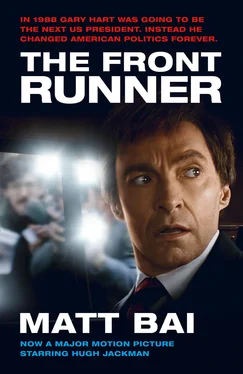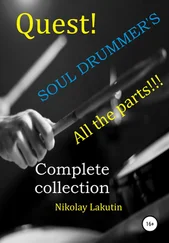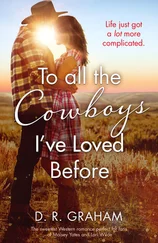I began to notice how the issues he had first brought to the debate in the early 1980s, like energy independence and Islamic terrorism, were the same ones we were debating now, because so little had been achieved in all the time since. When a friend sent me a link to a sale on eBay, in which some collector was selling the issue of People from 1987 with Donna Rice sprawled across the cover in a bathing suit, I paid fifteen bucks for the plastic-wrapped magazine. I had no real reason to buy it, except that I suddenly felt compelled to take it out of circulation. I figured I was sparing the man one more indignity.
It wasn’t guilt, exactly, this feeling that had led me back to Hart’s cabin almost seven years after my first visit, like an archaeologist searching for shards of a lost political age. What I had written about Hart back then, a story I had now reread so often that I knew it almost by heart, hadn’t been wrong, at least not in any technical sense. But I had now come to believe there was something deeper I had missed, a connection between Hart’s defining moment and the era I inhabited. And I felt pulled to retrace that connection in order to understand how our politicians became so paralyzed and our media so reviled. It was worth figuring out what had really happened at Troublesome Gulch, and why, and how it had led the rest of us here.
For two decades after his abrupt exit from politics, Hart said almost nothing revealing about the incident that had precipitated it. (In a 240-page memoir published in 2010, titled The Thunder and the Sunshine, he dispensed with the entire scandal in a few lines, noting, “The circumstances are too well known, and to some degree, still too painful, to require repetition.”) This was, in part, because people stopped asking. After a few months, the TV producers and reporters had moved on to other scandals, and the lecture agents were only calling, sporadically, to see if Hart might want to do some kind of crass confession tour. Eventually the gravel road through Troublesome Gulch, like the ancient city of Petra, became lost to political explorers, too remote for anyone to care.
It was also because Hart thought—foolishly, as it turned out—that the rest of the world would move on faster if he didn’t keep reminding us of what had happened. Sitting in his cabin, far removed from affairs of state and having established himself as a prolific author and a specialist in international law, Hart would occasionally persuade himself that no one really thought about any of this anymore, that he might at last be remembered for his brilliance. Away from Washington, he could go months, even years, without feeling the prurient stares of strangers or the judgment of old friends. Then someone like me would come along, or some other politician or celebrity would be caught in an adulterous affair, and Monkey Business would surface again, tawdry and unsinkable. Even into his seventies, he could not outlast it.
But more than any of this, Hart stayed quiet because he held fast to the central conviction that had guided him, disastrously, through his existential career crisis in 1987—that what happened or didn’t happen with Donna Rice or any other woman was nobody’s goddamn business but his and his wife’s, and about as relevant to his qualifications for higher office as a birthmark or a missing tooth. For more than twenty years, despite the instant opportunity for public redemption it would have afforded him, Hart would not admit to the affair or shed any light on the events that had led to his disgrace—not to interviewers, and not to the friends and former aides who were more reluctant to broach the subject. He believed the entire question, even now, to be an incursion into his zone of privacy, a triviality that it was his duty, as a public figure, not to legitimize.
Once, over drinks, one of Hart’s close aides from the period told me that Rice, like Hart, had steadfastly denied, even in private, having consummated an affair. I asked him whether he was actually suggesting that Hart, despite his reputation for promiscuity at the time, hadn’t slept with the woman who would forever be linked to his ruined ambitions. The former aide looked around the bar and leaned closer to me, his voice dropping to a whisper. “I fear not,” he said, looking genuinely pained.
If this was so, then the historical irony was hard to fathom. Because the story of Hart and the blonde didn’t just prove to be Hart’s undoing; it was the story that changed all the rules, a sudden detonation whose smoke and soot would shadow American politics for decades to come. Somehow, political and personal lives had collided overnight to create what was, in hindsight, the first modern political scandal, with all the attendant satellite trucks and saturation coverage and hourly turns in the narrative that Kafka himself could not have dreamed up. The unrelenting assault that Hart and family and their closest advisors had encountered during those five days would become an almost predictable rhythm of political life at the dawn of the twenty-first century, and it would spawn an entire industry of experts who knew—or claimed to know—how to navigate it. But it was Hart, the standout prodigy of a new generation, who opened the door.
All these years later, Hart confided, he mostly remembered snippets from that week, painful and disjointed scenes that surfaced only when he allowed them to. Like the moment in New Hampshire when, nearly toppled by the scrum and blinded by flashbulbs, he saw a small boy, maybe four or five, about to be run over by the human crush of cameramen and photographers. Panicked and furious, Hart spotted Ira Wyman, the venerable Newsweek photographer, crouched in front of him. Ira, an amiable, decent man and esteemed photojournalist, had long been with Hart and his wife, through all the days on planes and nights in hotel bars. “Help me,” Hart remembered croaking, in a kind of woozy desperation. He grabbed for Ira’s camera strap. “Ira, help me.”
Flash, came the response from the ground near his knees, as Ira evaded Hart’s grasp. Flash flash flash.
“It was a nightmare,” Hart told me flatly one night as we sat in his upstairs study. “We were in some kind of Oz land. For years and years after, people would stop me in airports and say, ‘You should have stayed in the race.’ I mean, they had no idea.” He paused, shook his head. “They had no idea. ”
In his own mind, he had not been driven out of presidential politics, as most everyone else saw it, but rather had walked away disgustedly. He thought of himself as Gary Cooper in that last scene of High Noon, throwing his badge in the dirt, thinking, If this is how it has to be, then find someone else. (Hart preferred not to think about his failed and embarrassing attempt to reenter the race late in 1987, which he would ever after regret.) This had, after all, been the animating theme of the statement he made at the end of that week of scandal, when he came down from the cabin and officially withdrew—a speech that probably should have been remembered, like Eisenhower’s oration on the military-industrial complex, as one of the most prescient warnings in modern American politics, but that, like so much else about the moment, had been almost entirely buried in the public consciousness. Even Hart, perhaps falling back on his usual coping mechanism, claimed barely to remember it.
“I’m not a beaten man—I’m an angry and defiant man,” Hart had declared then, to raucous cheers that he felt the need to quiet. “I said that I bend but I don’t break, and believe me I’m not broken.” Red-cheeked and gripping the lectern, he went on:
In public life, some things may be interesting, but that doesn’t necessarily mean they’re important. … We’re all going to have to seriously question the system for selecting our national leaders that reduces the press of this nation to hunters and presidential candidates to being hunted, that has reporters in bushes, false and inaccurate stories printed, photographers peeking in our windows, swarms of helicopters hovering over our roofs, and my very strong wife close to tears because she can’t even get into her own house at night without being harassed. And then after all that, ponderous pundits wonder in mock seriousness why some of the best people in this country choose not to run for higher office. Now, I want those talented people who supported me to insist that this system be changed. Too much of it is just a mockery. And if it continues to destroy people’s integrity and honor, then that system will eventually destroy itself. Politics in this country, take it from me, is on the verge of becoming another form of athletic competition or a sporting match. We’d all better do something to make this system work, or we’re all going to be soon rephrasing Jefferson to say, “I tremble for my country when I think we may, in fact, get the kind of leaders we deserve.”
Читать дальше












